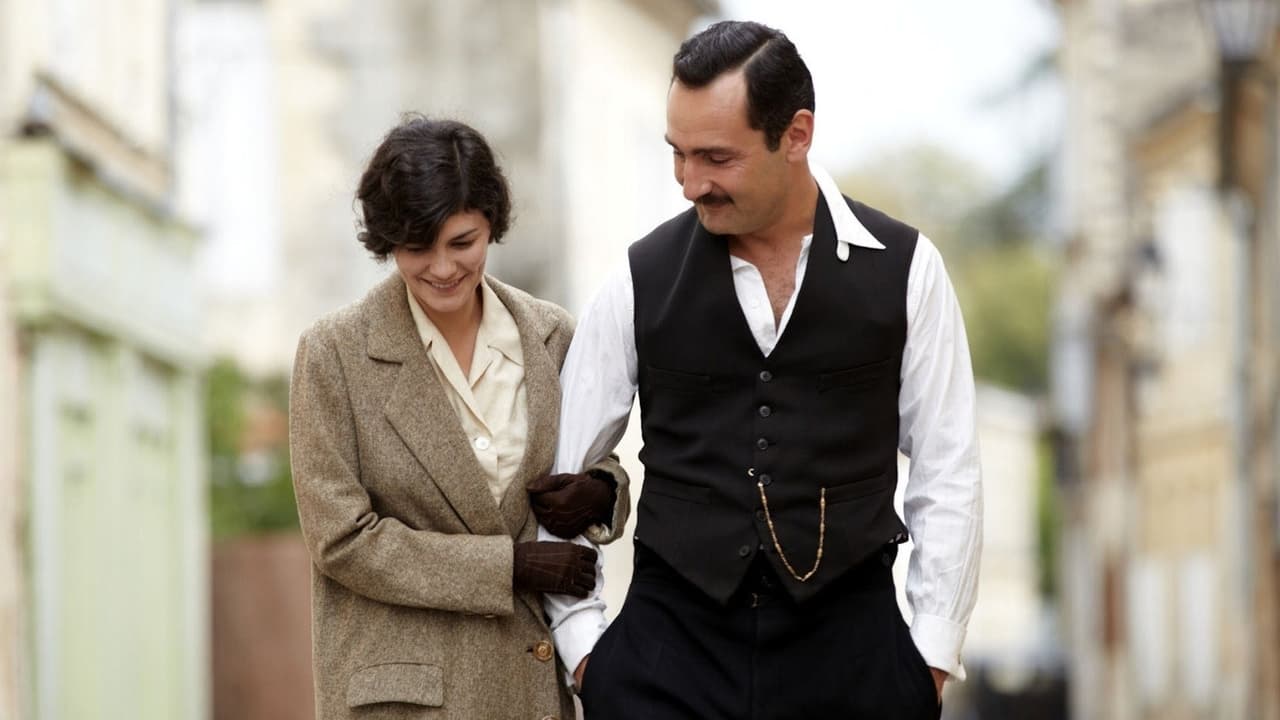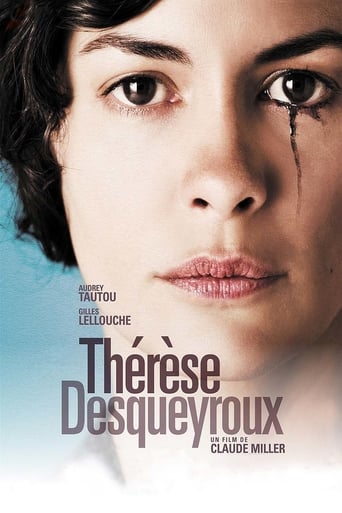

Instead, you get a movie that's enjoyable enough, but leaves you feeling like it could have been much, much more.
... View MoreIt’s fine. It's literally the definition of a fine movie. You’ve seen it before, you know every beat and outcome before the characters even do. Only question is how much escapism you’re looking for.
... View MoreIt's the kind of movie you'll want to see a second time with someone who hasn't seen it yet, to remember what it was like to watch it for the first time.
... View MoreBlistering performances.
... View MoreIs there anything this actress can't do? I went into the film to see a woman deal with the social pressures of a period, maybe a film that reminded me of "The Age of Innocence", a time where women had to sit, listen, and maybe "obey" the social conventions. The preview was a bit elusive because it made you forget that you are dealing with France, Paris, and the unexpected, and that's exactly what you get.By the end, the main character has grown tired and despondent, but she has left a mark that earns everyone attention if not respect, and the most interesting scene is at the end, in a conversation between her and a leading character that reveals life is not as simple as it appears. This was a period of change, and Therese found a way to at least get on her way to some peace, but nothing is perfect.Therese is a child of privilege. Everything is in place for her set up marriage to improve all of those involved. Unfortunately, as she admits early in the film, she must deal with her own personal conflicts, and this might not be possible. She eventually finds a possible solution to her problems, but this might lead to even more problematic resolutions. What makes the film even more interesting is that her husband eventually becomes the more puzzling of the characters. He is not the standard chauvinistic and domineering standard. There is more to him, and that only leads to Therese becoming even more traumatized.The film is beautifully scored and photographed, and the art direction/costume design work here is reason enough to sit through the film, but as I said before, it's the entire cast's work that expands on that idea behind "Midnight in Paris", a kernel of a premise that Allen delivered with grace and fun. This is a serious film, and it shows that there is plenty of substance in everyone. Yes, powerful minds can be more than an asset at the right time. Just imagine what the lead character in "Frances" could have been if she had better luck. Therese is lucky she lives in the country, and that there is loyalty in her world. In the end, the film stops at a crucial time of her existence. Things are not over, just a new beginning.
... View MoreThe air-headed Audrey Tautou acquires a brain in this adaptation of a Francois Mauriac novel. She is heiress of thousands of acres of Aquitaine, including a huge stand of timber and miles of sandy beaches, and marries the man next door, who owns almost as much. She has a dreamy girl-friend (hubby's sister) who falls in love and is locked up for it, to marry the man of her family's choice. In short, Audrey is living in an open prison and decides to off her husband, who regularly takes four drops of arsenic for his heart condition. She forges a prescription and radically ups his dose until he nearly dies. The family sticks together and backs up her phony story, then locks her away in a tatty loft bedroom, deprived for ever of her infant daughter. Only at the end of nearly two hours does her husband announce that she is to be set free. She announces that she will move to a hotel in Paris and live her own life. On that happy note, the film ends, but not before we have lived through her hellish existence for a little too long. Recommended for Tautou's performance.
... View MoreFrench screenwriter, producer and director Claude Miller's fifteenth and final feature film which he co-wrote with French screenwriter Natalie Carter, is an adaptation of a novel from 1927 by French author and playwright François Mauriac (1895-1970) and a remake of a French film from 1962 by French filmmaker Georges Franju (1912-1987). It premiered Out of competition at the 65th Cannes International Film Festival in 2012, was screened in the Special Presentations section at the 37th Toronto International Film Festival in 2012, was shot on locations in France and is a French production which was produced by producer Yves Marmion. It tells the story about a woman named Thérèse Desqueyroux who lives in a Provencal village in France with her father and her grandmother. Thérèse has a close and sister-like relationship with a girl named Anne de la Trave who lives in a mansion with her mother and brother named Bernard who is a hunter and a landowner, but after Thérèse marries Bernard and her friend meets a man named Jean Azevedo they don't get to see each other as much as before and Thérèse begins to regard her marriage as conventional and as a prison of duties where she no longer recognizes herself.Distinctly and brilliantly directed by French filmmaker Claude Miller (1942-2012), this quietly paced fictional tale which is narrated by the main character and mostly from her point of view, draws a mindful and tangible portrayal of a cultured French woman who after choosing to become a wife and realizing what it entails is so plagued by her decision and bored by her Catholic husband that she commits a crucial act. While notable for its naturalistic and atmospheric milieu depictions, sterling cinematography by French cinematographer Gérard De Battista, production design by production designer Laurence Brenguier, costume design by French costume designer Jacqueline Bouchard and use of sound and light, this dialog-driven, monologue-driven and narrative-driven story about an independent-minded woman who discovers her true identity after becoming a someone in a bourgeoisie society depicts a multifaceted study of character and contains an efficient instrumental score.This internally dramatic, non-judgmental, rhythmic, reflective and romantic drama which is set in Argelouse in the Landes department in Southwestern France during the 1920s in the aftermath of the First World War and where a young woman falls in love with a Jewish man whom her family prevents her from seeing as they have a man from another family named Deguihelm in mind for her, and her closest friend whom has married her brother is suffocating in her matrimony, is impelled and reinforced by its fragmented narrative structure, substantial character development, subtle continuity, timely use of music, undertones of mystery and the distinguished acting performances by French actress Audrey Tautou, French actor, screenwriter and director Gilles Lellouche and French actress Anaïs Demoustier. A cinematographic, nuanced, eloquent and lyrical period piece which honors the art of storytelling in cinema.
... View MoreThis film is about a blue blooded woman marrying a tycoon, but quickly finds out that marriage is not a thing she likes.The title "Thérèse Desqueyroux" doesn't give the plot away, but the Hong Kong Chinese title does. As a result, I kept guessing how the plot will turn out. Initially, we see Thérèse having a rather entangled relationship with Anne, which may or may not have played a part in her dissatisfaction in Thérèse's subsequent marriage. Then, the marriage itself is portrayed well, with the husband giving Thérèse much love that is clearly not reciprocated.However, all these supposed seeds that led to the deed did not adequately explain Thérèse's criminal action. Without a plausible motive, I was left to wonder exactly why she did such a horrible deed. Such a lack of motive may drive suspense and keep viewers on edge, but in "Thérèse Desqueyroux" it only serves to confuse.In addition, the subplot between Thérèse and Anne, and between Anne and Jean were left hanging, which was quite a pity. The amazing contrasts between the pre-deed, post-deed and liberated Thérèse could not help to lift "Thérèse Desqueyroux" to becoming a great film. I think it is a good film but it is unfortunately masked by hanging subplots and confusion.
... View More